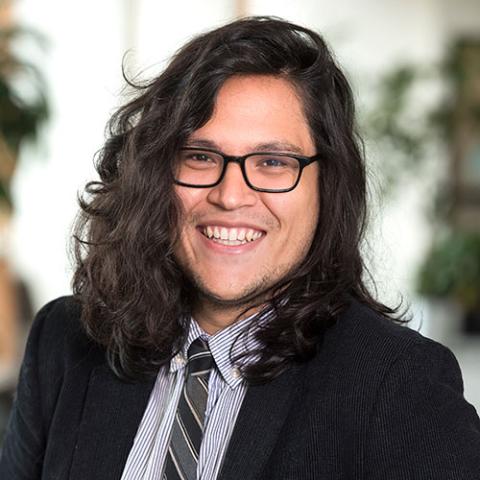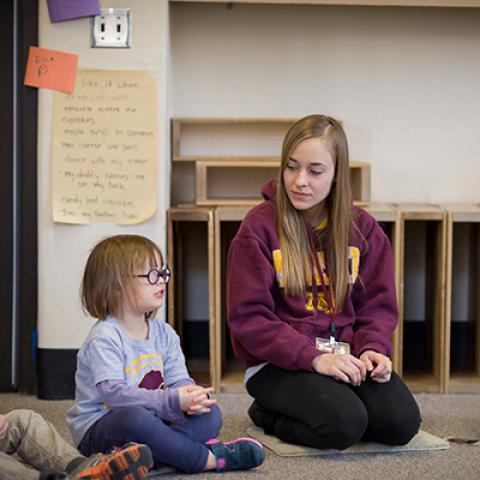Early childhood education MEd (licensure)
Earn a license to teach in early childhood (birth-3rd grade) classrooms in Minnesota. Build a strong foundation in child development theory, research, and developmentally appropriate methods that you can apply in the classroom.
After successfully completing program requirements, you’ll earn your MEd and be recommended for a license to teach in early childhood classrooms (birth-3rd grade) in Minnesota.
This program is for students pursuing their first Minnesota teaching license. There are no prerequisite courses required for admission.
If you're already licensed to teach elementary education in Minnesota, see our additional licensure program for information about how to add an early childhood education license.
Find what drives you – join us!
- Student teach at the Child Development Laboratory School, an on-campus preschool and a living laboratory for early childhood curriculum development.
- As a teacher licensure student at the University of Minnesota, you’ll be part of a program that’s well respected in Minnesota school districts. Our students are highly sought after by Minnesota school principals and superintendents.
- Earn a master’s degree and prepare for potential career advancement opportunities like moving into school or district administration.
Early childhood program mission statement
The Institute of Child Development’s early childhood education programs recognize that all children deserve equitable learning experiences so they can achieve their full potential. Our academic programs are rooted in the science of child development, which tells us that high-quality early childhood education occurs in the context of positive relationships among teachers, children, and their families. We are committed to training educators who build strong relationships, embrace diversity, value full inclusion, and work to eliminate structural inequities that limit children’s educational opportunities.
We're driven to make a difference
Quote from Kayne Lussier

Through the ECE program, I was able to work with a wide range of educators from Infant Specialists to Elementary School Teachers. I learned how to transfer my study in child development into practicable pedagogy.
Curriculum
Based in developmental theory, our curriculum provides you with the skills needed to meet each child where they are in their educational journey. To prepare you to teach children from birth to 3rd grade, coursework will include classes on early childhood education theory and methods, and elementary education methods.
You’ll complete two student teaching experiences: one in an early childhood classroom and one in a lower elementary classroom (K-3). To earn your MEd, you’ll complete a capstone project on how to improve early childhood education teaching methods. Admission is available for fall and spring sessions.
Early childhood education
- Foundations of early childhood education
- Social and emotional learning
- Cognitive and language learning
- Creative and motor learning
- Education of infants, toddlers, and preschool children with disabilities
Teaching methods
- Reading instruction
- Language arts instruction
- Science instruction
- Teaching English learners
- Social studies instruction
- Mathematics instruction
job placement within one year.
Source: 2022 UMN Office of Teacher Education survey
Careers
Salary outlook
A teacher's salary depends on two factors: number of years teaching and level of education. A teacher with a master's degree is able to start at a higher salary. Minnesota teachers tend to make more than the national median wage.
Source of national salary information: Bureau of Labor and Statistics: Occupational Outlook Handbook
Job outlook
Source of national job outlook: Bureau of Labor and Statistics: Occupational Outlook Handbook
Preparing students to be leaders in the classroom
Quote from Joel Knorr

The University of Minnesota Early Childhood Education Master's Program is setting up their student teachers for success! We've found U of M students have a deep understanding of developmentally appropriate practices that are aligned with standards. U of M students have a deeper understanding of developmental psychology and inquiry-based instruction, and demonstrate a strong understanding of strategies for active engagement.
How to apply
Admissions requirements and deadline
Timeline
We accept applications for our early childhood education M.Ed. program each year. Two groups of students typically apply to our program. Follow the timeline that’s right for you.
Students transitioning from the BS + MEd program
Students earning an early childhood foundations of education bachelor’s degree at the University of Minnesota are eligible to earn a Minnesota teaching license, and a master’s degree in early childhood education in just 5 years.
Applications are open for the fall semester only.
- December 15: Deadline to apply for fall admission
Applicants applying directly to the M.Ed program
Students without an early childhood undergraduate degree from the University of Minnesota don't need to complete particular prerequisite courses to apply to this program. Once admitted, you may take prerequisite courses listed in the catalog. Applicants must have a bachelor’s degree, with a minimum GPA of 2.80.
Applications are open year-round for students applying directly to the M.Ed program.
- December 15: Priority deadline for fall applications to be considered for financial assistance
- February 15: Final deadline for fall applications
- September 15: Deadline for spring applications
Test scores
No tests are required for you to apply to the program (except TOEFL scores for international students). We don't require the GRE. If you're an international student, please enter your self-reported TOEFL scores in this section. Submit an official score report from TOEFL to the University of Minnesota (institution code 6874). View the U of M’s TOEFL score guidelines and expectations.
Information for international students
- English language test scores: For students whose first language is not English, the Test of English as a Foreign Language (TOEFL) is required. The only exception is for non-native English speakers who completed the entirety of their undergraduate degree (four years) in an English-speaking country within the last five years. You’ll need to enter your self-reported TOEFL scores in the online application and send your official electronic TOEFL scores to the University of Minnesota (institution code 6874). View the U of M’s TOEFL score guidelines and expectations. Please note that the Institute of Child Development requires a TOEFL speak score of 23 or higher.
Tuition and funding
Tuition for our MEd program follows the Masters in Education and post-baccalaureate tuition rates for the College of Education and Human Development (CEHD). Full-time enrollment is 6 to 14 credits per semester.
Every year, students in the CEHD’s initial licensure/MEd programs receive more than $600,000 in scholarships. Learn more about financial support for future teachers.
There are also scholarships dedicated for students enrolled in this program.
Additional resources
- Tuition rates
- Graduate/professional loan comparison chart
- Funding and tuition information from the Graduate School
- CEHD financial support for future teachers
- CEHD fellowships, scholarships, and grants
- Office for Equity and Diversity funding opportunities
- Disability Resource Center scholarship information
- Women’s Center scholarship information
- T.E.A.C.H. Early Childhood® MINNESOTA scholarship program
Application instructions
Before you begin
Before you begin the online application, gather the following materials:
- Unofficial transcripts: You must submit an unofficial transcript or academic record for each institution you’ve attended. International students must submit an English translation of their transcript.
- Personal statement: Tell us about what factors have drawn you to teaching. (You might include personal, social, or professional inspirations.) What experiences with children have influenced or informed your process? Reflecting on this, how do you anticipate this program will help you grow as a professional educator? Your essay should be no longer than five pages (12-point font, double-spaced). Include your name on the top of each page.
- Resume or CV: In your resume, highlight your work with children, classroom experience, diversity experience, and other experiences relevant to teaching young children.
- Two letters of recommendation: Identify and get contact information for two people who will serve as your recommenders. Recommenders should be individuals (e.g., administrators, colleagues, or instructors) who can speak to your experience working with children/youth or your commitment to educational equity.
- Application Fee: $75 ($95 for international applicants). Must be paid online with credit card.
Optional materials
- Diversity statement: If you wish to be considered for the Provost’s Professional Diversity Fellowship, please write a diversity statement on how your background, experiences, and achievements will contribute to the University's goal of promoting excellence through diversity. Learn more about the Provost’s Professional Diversity Fellowship.
Submit all materials through the University’s online application system. Please don't submit materials via mail. We cannot review your application until you've submitted all the materials listed below.
Your admissions decision will be emailed to you once your application has been reviewed, and all transcripts and credentials are authenticated by the Graduate School. Applicants are typically notified of admissions decisions four to six weeks after the application deadline for their selected term of entry. Incomplete applications cannot be reviewed.
Contact
Conceptual framework for early childhood teacher education
The Institute of Child Development’s Early Childhood Education programs recognize that all children deserve equitable learning experiences so they can achieve their full potential. Our academic programs are rooted in the science of child development, which tells us that high-quality early childhood education occurs in the context of positive relationships among teachers, children, and their families. We are committed to training educators who build strong relationships, embrace diversity, value full inclusion, and work to eliminate structural inequities that limit children’s educational opportunities.
The framework is results-oriented in that methods, field experience, and student teaching courses are grounded in developmentally appropriate practice, a critical component that is threaded throughout the program. Teacher candidates in the Early Childhood Education programs are trained to nurture children’s development via strong relationships, and make instructional decisions based on current research, national standards, and recognized theory. The framework’s research base includes a grounding text, the National Association for the Education of Young Children’s Developmentally Appropriate Practice in Early Childhood Programs. This manual is a distillation of current research related to facilitating the positive development of young children through appropriate interactions and teaching practices. We are also strongly guided by NAEYC’s anti-bias principles, summarized in the organization's statement, Advancing Equity in Early Childhood Education.
Teacher candidates in the Early Childhood program have opportunities to demonstrate their knowledge of high-quality, developmentally appropriate early childhood educational practices in field placements and two student teaching experiences. The skills teachers need are demonstrated in standards-based course assignments and documented in key assessments that provide evidence of a teaching candidate’s ability to put theoretical knowledge into action for children in the birth through grade 3 age range.